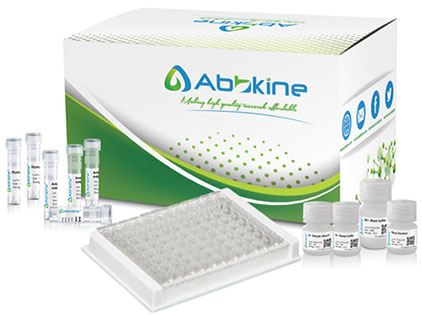Mouse Reactive oxygen species (ROS) ELISA Kit
Cat# KTE71621-5x96
Size : 96Tx5
Brand : Abbkine
Specification
| Product name | Mouse Reactive oxygen species (ROS) ELISA Kit |
| Reactivity | Mouse |
| Applications | ELISA |
| Applications notes | Mouse Reactive oxygen species (ROS) ELISA Kit employs a two-site sandwich ELISA to quantitate ROS in samples. An antibody specific for ROS has been pre-coated onto a microplate. Standards and samples are pipetted into the wells and any ROS present is bound by the immobilized antibody. After removing any unbound substances, HRP-Conjugate Mouse ROS detection antibody is added to the wells. Following a wash to remove any unbound HRP reagent, a Chromogen solution is added to the wells and color develops in proportion to the amount of ROS bound in the initial step. The color development is stopped and the intensity of the color is measured. |
| Detection method | Colorimetric |
| SampleType | Cell culture supernatants, Other biological fluids, Plasma, Serum |
| Assay type | Sandwich ELISA |
Product Properties
| Calibration range | 30 IU/mL-480 IU/mL |
| Limit of detection | 1.0 IU/mL |
| Usage notes | • Do not mix components from different kit lots or use reagents beyond the kit expiration date. • Allow all reagents to warm to room temperature for at least 30 minutes before opening. • Pre-rinse the pipet tip with reagent, use fresh pipet tips for each sample, standard and reagent to avoid contamination. • Unused wells must be kept desiccated at 4 °C in the sealed bag provided. • Mix Thoroughly is very important for the result. It is recommended using low frequency oscillator or slight hand shaking every 10 minutes. • It is recommended that all samples and standards be assayed in duplicate or triplicate. |
| Storage instructions | The unopened kit should be stored at 2 - 8°C. After opening, please store refer to protocols. |
| Shipping | Gel pack with blue ice. |
| Precautions | The product listed herein is for research use only and is not intended for use in human or clinical diagnosis. Suggested applications of our products are not recommendations to use our products in violation of any patent or as a license. We cannot be responsible for patent infringements or other violations that may occur with the use of this product. |
Additional Information
Image & description
-
View
Polypropylene nanoplastic exposure leads to lung inflammation through p38-mediated NF-κB pathway due to mitochondrial damage(KTE71621-10)
Author:JH Woo, HJ Seo, JY Lee, I Lee Publication name:Particle and Fibre Toxicology IF:10




Reviews
There are no reviews yet.